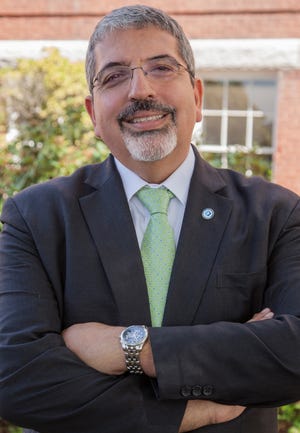Luis G. Pedraja

As the holidays come around, we tend to think about celebrations, friends and family. We wish each other happy holidays, filled with joy, health and love.
However, sadly, there is another side to the holidays that we don’t always discuss. The expectations, buzz and stress of the holidays often aggravate existing mental health issues, such as anxiety and depression. At the same time, many, including college students who need to seek assistance, fail to ask for help.
But why don’t they get help? And more importantly, why do we not talk about it?
In the Disney animated movie “Encanto,” about an enchanted Latine family, one of the top songs is “We Don’t Talk About Bruno.” But why? Why does the family not talk about him?
Interpretations of the song’s meaning vary, but most believe that an underlying message of the song is about the stigma often associated with mental health. As a Latino, I grew up not talking about mental health or seeking help for it. Members of my family and community struggled with undiagnosed mental health issues — but we did not talk about it. It was a taboo subject.
According to research studies, perceived stigma associated with mental health in Latine and Black communities often keeps community members from seeking help. A study of Black and Latine college students showed that perceived mental health stigma was higher, not only preventing them from seeking help but also from being able to identify others who might be struggling with mental health.
Similarly, stigma associated with mental health further marginalizes individuals in these communities who already struggle with discrimination, as well as exacerbating their ability to find housing and employment. So rather than address mental health issues or seek help, it is not discussed. But we need to talk about it and find ways to remove the stigma in our communities.
Throughout the pandemic more people struggled with mental health issues, but the resources did not meet the increased demand. In a recent presentation I attended, a researcher shared that over 50% of community college and university students met the criteria for one or more mental health problems. Even before the pandemic, 57% of college students felt hopeless. Yet, according to College Pulse, only 13% used on-campus counseling. In meeting with other college and university presidents, one of our primary topics is addressing mental health issues on our campuses and making this one of our top priorities moving forward.
The pandemic, peer pressure on social media, the increase in violence in our society, the constant bombardment of disturbing images from global conflicts, and increased anxiety about our future continues to traumatize all of us — not just college students but also faculty, staff and our community at large. Overcoming the perceived stigma of mental health issues is more critical than ever. We need to talk about it; we cannot afford to ignore this any longer.
Yet we cannot stop by just overcoming the stigma of mental health concerns; we must take action and increase the necessary resources to help those in need. For instance, although community colleges, like QCC, offer counseling and online resources, limited funding and lack of qualified providers limit what we can provide students.
For two years I participated in the state’s health care collaborative, where educators, health care providers and members of the governor’s Cabinet addressed strategies to increase health care resources, including mental health. I served on the subcommittee assigned to address the shortage of mental health providers in the state — a daunting problem that often puts a strain on our communities and hospitals.
Through that experience, I learned how critical the work of educators and community leaders can be in ensuring we train more mental health providers and increase resources, to assure those who need help can get it in a timely manner. There is still more work to be done in this area and we, as a community, need to continue to advocate for increased resources.
As the holidays draw near and you gather with family and friends, please make sure you do not ignore those around you who might be struggling with depression, anxiety or other mental health problems. Encourage them to get help, offer them your support and help them to navigate the system. Take time to talk to them.
One of the things that I love the most about Worcester is that we rally together to help those in need — whether that is basic human needs such as hunger, shelter and emergency aid, or by simply offering a kind word. So perhaps this holiday season, as people struggle with their mental health, we can be a little bit more compassionate, work to remove the perceived stigma and encourage those who need it to get the necessary resources. It is time for us to talk about Bruno.
Luis G. Pedraja is president of Quinsigamond Community College.
